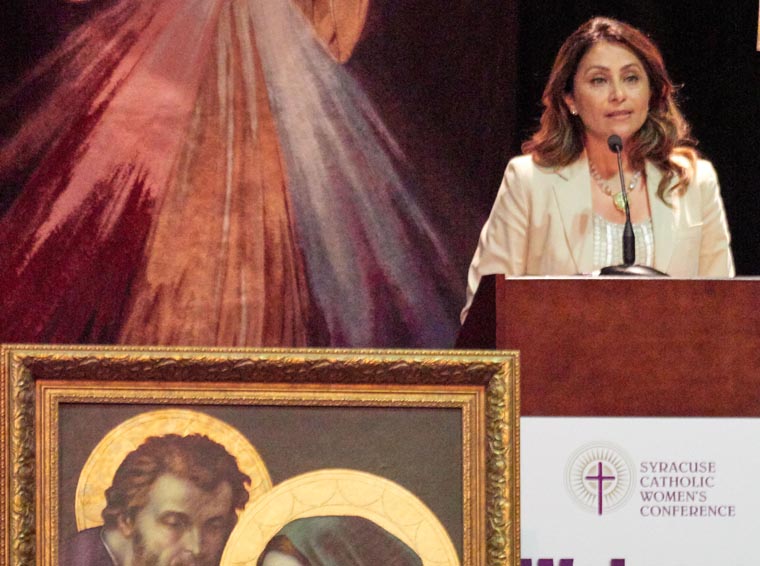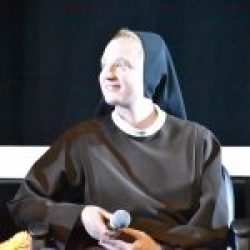By Katherine Long | Editor
More than 800 women gathered for a day of faith and fellowship Oct. 27 as the ninth annual Syracuse Catholic Women’s Conference was held at the Oncenter in Syracuse.
The day, themed “Trust in the Truth,” featured three compelling speakers, opportunities for prayer and confession, and time to visit with on-site vendors and fellow attendees before closing with Mass celebrated by Bishop Robert J. Cunningham.
Speaker Nikki Kingsley shared her story of conversion from Islam to Catholicism.
Born into a Muslim family in Pakistan, Kingsley grew up in Tanzania after her family relocated there. At 18, Kingsley returned to Pakistan where she was wed in an arranged marriage. She recounted becoming so unhappy with her life and marriage over the following years that she was at one point suicidal. In 1999, at the age of 30, she and her children took a trip to see family in America — and stayed to start a new life. Kingsley recalled for the audience getting a job, learning to drive, supporting her children, and eventually obtaining a divorce.
Throughout it all, Kingsley said she prayed devotedly and tried “to do everything right as a good Muslim.” Her prayers changed from ones begging Allah to get her out of a problem to ones of searching for him, she explained. “Questions started to rise up in my heart,” Kingsley said, “and I couldn’t find answers that satisfied me.”
While on a tourist stop at St. Patrick’s Cathedral in New York City, Kingsley heard a woman’s voice whisper in her ear, she said. She knew immediately it was Mary, whom she knew from Islam, she said. Kingsley went to the chapel, where she stood before a statue of Mary, but heard nothing more.
About six months later, around five in the morning, “I felt like I was gently awakened out of a deep sleep,” Kingsley said. “I saw Jesus and Mary at my bedside.”
“They spoke to my soul, they spoke to my spirit,” she said. “There were no words that I heard, but there was a communication that was much deeper than words.”
Kingsley said she had additional dreams and felt drawn to all things Christian, experiences which left her confused and frustrated. “But there was one thing I could not deny, and that was the peace that came with it and the knowing that God was behind this all,” she said.
Kingsley shared her experiences with a friend, who then invited her to church. Kingsley demurred, saying she was not looking for conversion.
After a year, she went to a Christmas service at a church. But when she got back to her car, “I just felt so disappointed. The one who had been calling me was not there.”
Kingsley again told her friend about her experience, and again her friend invited her to church. One morning, the two women walked into her friend’s Roman Catholic church. “I walked in and took my first breath, ladies, and I said, ‘He’s here. I can feel him,’” Kingsley said to applause from the crowd.
“From that day on I started showing up in that church when it was empty and I would sit and I would argue with that crucifix for hours,” she said. “I would tell him, ‘You’re not the Son of God; there is no Son of God. What do you want from me? Why are you doing this to me?’ And I would be upset and angry… and then I would just start sharing my day with him.”
This went on every day for months, Kingsley said, and “this Jesus became like my best friend.”
Eventually, “Jesus had enough,” Kingsley said, “and he decided it was time.” That day she heard the audible voice of God, she said. “And he said to me, ‘Who are you to tell me who I can be and cannot be? If you really want to know the truth, come back like a child and I will tell you the truth.’”
Kingsley said she first ran out of the church but came back, sat down, and quieted her mind. She described a “bolt of light” that came from the cross and moved through her body “and I knew the truth. I knew he was the Son of God.” She fell to her knees, she said, “sobbing and crying, ‘I believe you are the Son of God, I believe you are the Son of God.’”
“That day I accepted Jesus Christ as my Lord and Savior, as the Son of God, and he led me into the father’s arms,” Kingsley said. “And the love that I experienced that day was so powerful…. that I could barely take it in; it was like trying to drink in the ocean…. And Abba said to me, ‘I have waited so long for you.’”
Father Shawn Monahan, a priest of the Oblates of the Virgin Mary, drew on his own vocation story and his experience as a novice master for his talk, titled “Our True Identity as God’s Beloved.”
Father Monahan’s ministry as a priest has included youth ministry, prison ministry, hospital chaplaincy, RCIA, and spiritual direction. All of these ministries helped him to discover how broken and wounded people are, he noted. These experiences led to service as a spiritual director, which in turn prepared him for his current ministry, formation of seminarians, “to prepare and help young men be healers, agents of healing for you, for the people of God.”
Father Monahan shared what he’s learned about growing and maturing in the Christian life, which includes self-knowledge, self-acceptance, and self-gift.
Self-knowledge, he said, is “being aware of what’s going on inside of me” and discerning what God is asking.
Self-acceptance is where we find our identity, Father Monahan said. Usually, people find their identities thorough their successes, titles, and achievements or through their failures, wounds, and brokenness, he said.
However, “our identity is received, not achieved,” Father Monahan said. “You are God’s daughter and there is absolutely nothing you can do about it.”
Warning the crowd that he was about to say something “scandalous,” Father Monahan underlined: “God does not approve of you…. If it was possible for God to approve of you, it would be possible for him to disapprove of you — and God is a lover, not an approver. God loves you and there’s nothing you can do about it.”
Self-gift is the gift of one’s self through vocation, ministry, mission, he continued.
Father Monahan noted that these dynamics are not linear, but rather a spiral that deepens throughout life. He explored the wounds that all people face — things like shame, fear, hopelessness — and encouraged the crowd to find healing through the sacraments. He urged those present to “take our wounds and trust them to Mary and ask her to take us to the father,” where we can experience healing, comfort, and compassion from Jesus.
The women in attendance also heard from Susan Tassone, author, speaker, and “champion of the holy souls in purgatory,” who outlined key ways to help those souls: prayers through Masses, the Stations of the Cross, and the rosary. Tassone reminded the attendees that women have a unique opportunity to influence the world. “You are the convincing witnesses to the gospel of Jesus Christ in a world so much in need of God’s care and grace,” she said.
Carol Fisher, who served as the conference’s emcee, offered her thoughts on the day in an email: “We walked in with hundreds of women. Many of our hearts were filled with deep concerns for our families, our church, and our country. We left filled with a joy overflowing with love, gratitude, excitement for the future on earth and eternally along with a deeper sense of responsibility and practical means to make a difference!”





